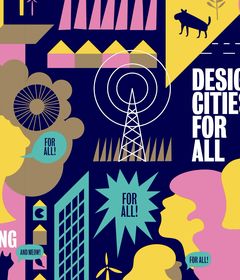The reality of the climate crisis and how it impacts our cities is fundamentally a question of social justice and democracy. A transition towards a climate just future has to be deeply inclusive – that is the big challenge for our democracies. As the risk of a destructive 3+ Degrees temperature rise keeps growing, transitioning together is about the institutional infrastructures that enable systemic change: after all, climate change is not an isolated crisis, but a symptom of a system deeply out of balance. How can we design legitimate and equitable pathways towards a climate-resilient and thriving future?
This triptych aims to explore what this means for our cities, and for us as individuals and communities – and identify some of the core features of a more hopeful future. In this second part, we are going to explore the crucial question – how can we transition in ways that are genuinely inclusive, in a diverse and unequal world?
After having written biographies for ten years, cultural historian Eva Rovers decided to dedicate her writing to civil resistance and the ways citizens can help battle climate change. She has become a leading advocate of climate citizens’ assemblies and is the co-founder of Bureau Burgerberaad. A ‘burgerraad’ – the Dutch word for citizens’ assembly – complements the current political system and allows members of the public convene to look for solutions to the toughest political challenges (like climate change) to help politicians make decisions about these complex topics. The participants in a citizens’ assembly form a cross-section of society. Why would a citizens’ assembly succeed where politicians fail?
Zack Walsh is a Senior Researcher of Economics and Governance at the One Project. One Project is a non-profit initiative working globally with communities to design, implement, and scale new forms of governance and economics that are equitable, ecological, and effective. The models of democracy that run the world are based on 17th-century ideas. They rely on win-lose dynamics, depress participation, and fail to cultivate the full wisdom of humanity. By using participatory design processes and publicly-owned technology platforms, we could create more effective forms of self-governance.
For DCFA Fellow Dark Matter Labs (London), the principles of strategic design are the ultimate tool to apply to ‘big picture’ systemic challenges like education, urban design, and climate breakdown. Over the past 5 years, Dark Matter Labs has found itself involved in several collaborations where efforts to transition society in response to technological revolution and climate breakdown look to the city as a critical problem-space and tangible unit of change. In the coming weeks, Indy Johar and Joost Beunderman will continue their research in Pakhuis de Zwijger’s two-year programme, focusing on what it takes to design a climate-resilient and thriving future for all.


The Correspondent - The best-known democratic innovation is the citizens’ assembly. What is it, why is it a good idea, and what are its drawbacks? We, proponents and advocates of this concept, lay it out for you in this article. >>

Zack talks about his work with the One Project, and about his interest in the ideas of commoning and the commons, which encompasses both natural and cultural resources - from air, earth, and water, to art, music, and digital information. >>












